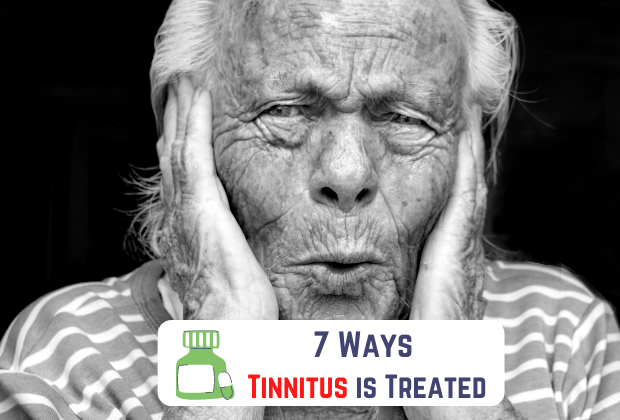Tinnitus, commonly known as ringing in the ears, is caused by many different issues—from ear infections to head injuries. In most cases, the ringing in your ears comes from an overactive reflex in your auditory nerves, and there are multiple ways to treat it. Here are 7 Ways Tinnitus is Treated to get rid of tinnitus once and for all.

What Causes Tinnitus ?
There are many theories as to what causes tinnitus; some people believe it’s an ear infection or excessive earwax, while others suspect a connection to stress or caffeine.
It’s important to realize that there isn’t a cure for tinnitus, but different therapies can help manage your symptoms. For example, wearing hearing aids can help dampen disruptive noises and relieve some of your worries. Certain medications may help mask ringing in your ears, too.
You might also benefit from acupuncture treatments or relaxation techniques like meditation or yoga (to name just a few). Your doctor will be able to refer you to experts who can help you find relief if you’re open to trying new approaches.
1) Home Remedies
Some of these home remedies may help to lessen tinnitus. You’ll notice some overlap between categories, which is because there isn’t a one-size-fits-all solution for treating tinnitus.
Like any health issue, it can vary from person to person and there are many ways to alleviate symptoms. Your doctor may also be able to provide recommendations based on your case history.
So experiment with natural remedies and let us know what you find! It might be that an herbal remedy, dietary supplement or homeopathic pill can help you get rid of your ringing in ears faster than other types of treatment.
2) Medication
Medication is one of the most popular ways tinnitus is treated. The most common medications prescribed to treat tinnitus are antidepressants, including Amitriptyline (Elavil), Desipramine (Norpramin), and Citalopram (Celexa). These medications can be used alone or in combination.
If you suffer from chronic insomnia, taking these medications may help you sleep more easily by improving your quality of sleep. However, they don’t relieve many of tinnitus’ symptoms or improve overall tinnitus severity.
When taking antidepressant medication for tinnitus, it’s important to work with your doctor to find a dose that won’t cause side effects like drowsiness and weight gain that could lead to dangerous complications.
3) Acupuncture
While some people have had success with acupuncture [1] , tinnitus has yet to be proven as treatable by any alternative medicine. In most cases, it’s a good idea to stick with treatments backed by sound medical research.
That being said, many patients find that acupuncture offers benefits beyond just treating their tinnitus—like relieving stress and anxiety or improving sleep.
If you want to give it a try for your tinnitus symptoms, make sure your acupuncturist isn’t trying to cure your ringing ears with needles alone. Opt for traditional Chinese Medicine (TCM) techniques instead.
4) Hearing Aids
For some, mild tinnitus can be treated with hearing aids. If your tinnitus is result of nerve damage or age-related hearing loss, hearing aids may improve your condition.
Hearing aids can make tinnitus louder if they’re not properly fitted or if you have an underlying medical condition. However, most people find that their quality of life improves significantly once their initial ringing has lessened somewhat to become more like background noise. A well-fitted hearing aid can sometimes reduce a ringing sound by up to 50 percent! Here are some other ways to manage tinnitus.
5) Surgery
If your tinnitus stems from a physical issue, surgery may be an option. Oftentimes, tinnitus can be caused by pressure on one of your ear drums. When one eardrum is compressed or pushed down, it can result in temporary hearing loss.
The same thing can happen when a person has fluid build-up in their middle ear. If these issues are resolved with surgery, then potentially both ears could regain full hearing ability and you’d experience little to no symptoms again—in theory at least.
6) Sound Therapy
Among the most effective ways tinnitus is treated, sound therapy has its own admirers.
Sound therapy uses sound (generally music) to mask or cover up tinnitus sounds. It can help people relax, distract them from their tinnitus and reduce stress, anxiety and depression related to it.
The goal of sound therapy is not necessarily to get rid of tinnitus – it’s more about treating your reaction to your tinnitus and helping you become less aware of it.
A common example involves a patient listening to music through headphones as he lies in bed; that way, when he hears his blood rushing or a busy street outside, he doesn’t worry about whether it’s just his imagination or if his tinnitus has returned.
Earwax removal
Your doctor will examine your ear canal and determine if there’s excess buildup of earwax, an infection or other issues that may be affecting your hearing. He or she may clean out your ears by irrigating them with a small tube connected to a syringe, removing some of the wax along with any other debris that may be present.
You may have to repeat these cleaning sessions several times over several weeks before your tinnitus symptoms subside. If no underlying medical condition is causing your tinnitus, home remedies like ear wax removal can help get you relief.
Consult a doctor before attempting to remove earwax at home. In some cases, severe infections in your inner ear could cause hearing loss, vertigo or facial paralysis — all of which would require immediate medical attention.

Lifebing is driven by an unrelenting passion for promoting health and well-being, our team is wholly committed to curating exceptional content and immersive experiences.
